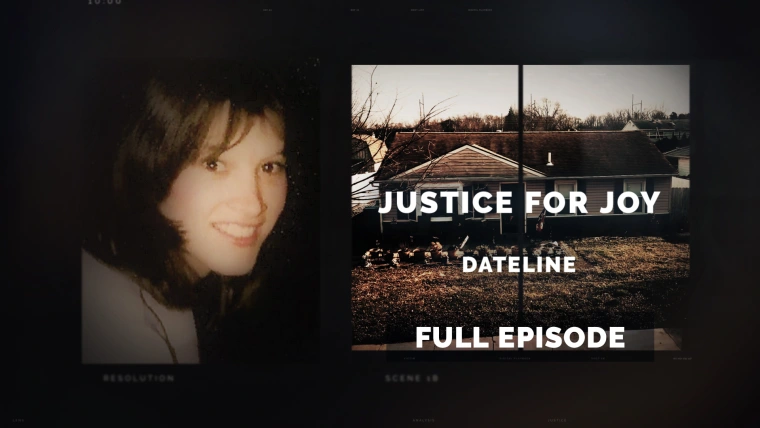“Justice for Joy”: Dateline Reports on Joy Hibbs Homicide August 22 2025

On Friday, August 22, 2025, Dateline NBC airs a powerful two-hour special titled Justice for Joy, hosted by Blayne Alexander. The episode revisits the harrowing 1991 murder of Joy Hibbs, a beloved wife and mother whose death remained a cold case for more than three decades. Through emotional interviews and a detailed look at the flawed investigation, the program sheds new light on how the case was finally solved — and why it took so long.
Contents
The Murder of Joy Hibbs
On April 19, 1991, Joy Hibbs was found dead inside her Croydon, Pennsylvania, home after a fire broke out. Initially believed to be an accident, an autopsy revealed Joy had been beaten, stabbed, and likely strangled before the fire was intentionally set. She was 35 years old, a medical assistant and devoted mother of two.
Her husband Charlie Hibbs had an alibi — he was working at a construction site in Philadelphia — but despite this, early suspicions within the Bristol Township Police Department turned toward him. At the same time, a more likely suspect, a neighbor named Robert Atkins, was largely ignored by investigators. This early misdirection would come to define the failure of justice that followed.
The Suspect Who Was Protected
Robert Atkins lived just two doors down from the Hibbs family. Known to have a temper, he had a falling out with Joy weeks before her death over a $20 marijuana deal. Joy’s son, David Hibbs, recalled overhearing Atkins screaming at his mother on the phone. When asked by police if he could think of anyone who would want to harm his mother, David immediately named Atkins.
Yet despite this, Atkins was never brought in for formal questioning in 1991. Years later, it was revealed that Atkins was a confidential drug informant for the Bristol Township Police. A former police chief told Detective Mike Slaughter during a 2015 interview that officers had been instructed to “stay away” from Atkins. Narcotics officers reportedly wanted to protect their informant and prevent interference with ongoing drug cases — a decision that compromised a murder investigation.
A Son’s Long Quest for Justice
In the years that followed, David Hibbs grew increasingly frustrated with the lack of progress. In 2006, he attempted to obtain police records to pursue an independent review of the case but was denied. He was told unofficially that his father was the primary suspect — a claim that caused a rift in the family. David temporarily distanced himself from his father, unsure of what to believe.
Detective Slaughter inherited the case in 2014. At first, he assumed it was unsolvable, with a crime scene destroyed by fire and few reliable records. But as he reviewed the materials, he found glaring gaps. Interviews were poorly documented, leads were dismissed, and Atkins was never thoroughly vetted. Slaughter cleared Charlie Hibbs and began piecing together what had really happened — and why the investigation had failed.
A Long-Buried Confession
In April 2014, Slaughter reinterviewed Atkins, who stuck to his original story and denied any involvement. However, Atkins did confirm he had an argument with Joy about marijuana and admitted to working with police as a confidential informant. Slaughter continued pushing forward, speaking with former officers and eventually obtaining a stunning admission in 2015 from the late former chief Thomas Mills: Atkins had been shielded by the department.
The breakthrough came years later, when Atkins’ ex-wife, April Atkins, showed up at the police station. She revealed that on the day of the murder, Robert came home covered in blood and told her, “I stabbed somebody and lit a house on fire.” He later disposed of evidence, including his sneakers, during a family trip to the Poconos. April said she kept silent out of fear, alleging Atkins had beaten her and threatened to frame her for the murder if she ever spoke out.
Arrest, Trial, and Conviction
Atkins was arrested in May 2022 after April’s revelations were corroborated and a grand jury was impaneled. He was charged with first-degree murder and two counts of arson. The trial took place in early 2024 and lasted four days. It was a bench trial, meaning the judge determined the verdict.
Judge Wallace Bateman Jr. found Robert Atkins guilty and sentenced him to life in prison without the possibility of parole, along with an additional 15–30 years for the arson charges. He called the original investigation “disturbing” and criticized the police department’s decision to protect a murder suspect due to his informant status.
The trial featured powerful victim impact statements from Joy’s husband, children, and granddaughter. Charlie Hibbs described his torment over what Joy endured and condemned Atkins as “pure evil.” Joy’s daughter Angie and son David spoke about the emotional toll of losing their mother — and the devastating delay in justice caused by corruption and incompetence.
Fallout and Accountability
While Atkins’ conviction brought long-overdue justice to the Hibbs family, questions remain about the original investigation. Detective Slaughter and the Hibbs family have been outspoken in their belief that the Bristol Township Police failed them. David Hibbs has called for the original officers involved in shielding Atkins to be held accountable, arguing that their inaction was a betrayal of duty.
Though many of the officers involved in the 1991 investigation have since died or retired, their decisions cast a long shadow over the case. In a public statement, the Bristol Township Police Department cited internal reforms and a commitment to professional standards, but did not address the specific allegations due to the time that has passed and changes in personnel.
Conclusion
Dateline NBC’s Justice for Joy is more than a true crime story — it’s a sobering examination of how institutional failures can prolong a family’s suffering for decades. Through determination and the courage of one woman who broke her silence, a long-cold case was finally solved. But the scars remain for those who lost Joy Hibbs, not only to a brutal murder, but to 33 years of injustice.









